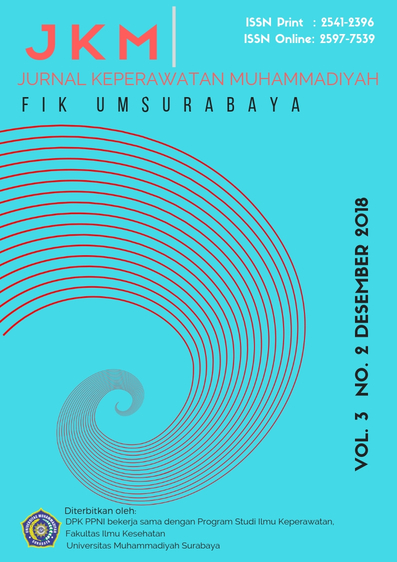Risiko Gangguan Perkembangan Pada Balita Yang Mengalami Kematian Maternal
DOI:
https://doi.org/10.30651/jkm.v3i2.1756Abstrak
Mortality towards pregnant and maternity women still turns out to be a great problem in Indonesia. According to Indonesia’s Demographic and Health survey in 2012, Indonesia as the country with the highest mortality rate in Southeast Asia. Maternal mortality has short-term and long-term consequences, and those consequences are more significant than mother’s non-maternal mortality of women with reproductive age. Maternal mortality causes the shifting of parenting towards toddlers who are left behind. This can increase the risks of developmental disorders towards toddlers due the lack of focus of the caregivers on the toddlers, consequently the stimulation will be reduced as well. This research aims to analyze whether maternal mortality increases the risks of developmental disorders towards toddlers. The method was using comparative study with retrospective cohort study approach. The research subjects were 41 toddlers who experienced maternal mortality in Probolinggo Regency (case group), and 41 toddlers who did not experience maternal mortality (control group). On the samples, the assessment of the suitability of development stages based on age appropriate KPSP forms. The statistical examination indicates that there is a difference of developmental disorder between case group and control group with p = 0,023 (<0,05), and RR = 2,5. Research conclution indicates that maternal mortality increases the risks of developmental disorder towards toddlers by 2,5 times.
Referensi
Anderson, F. W. J., S. U. Morton, S. Naik, B. Gebrian. 2007. Maternal Mortality And The Consequences On Infant And Child Survival In Rural Haiti. Matern Child Health J. 11 : 395–401.
Berkman, L. F and E. M. O’Donnell. 2013. The Pro - Family Workplace : Social And Economic Policies And Practices And Their Impacts On Child And Family Health. National Symposium On Family Issues 3. New York : Springer Science + Business, 157 – 179.
Dinkes Jatim. 2015. Program Indonesia Sehat Dengan Pendekatan Keluarga. Surabaya.
Dinkes Kab. Prob. 2016. Rancangan Awal (Ranwal) Rencana Kerja (Renja Tahun 2017. Probolinggo.
Hermanto T. J. 2012. Menurunkan Kematian Ibu Hamil dan Melahirkan Melalui Pemberdayaan Wanita. Surabaya : Global Persada Press.
Hurlock, E. B. 1997. Perkembangan Anak Jilid I. Agus Dharma., ed. Jakarta : Penerbit Erlangga.
Kemenkes RI. 2015. Profil Kesehatan Indonesia Tahun 2014. Jakarta : Pusat Data dan Informasi Kemenkes RI.
Miller, S. and J. M. Belizán. 2015. The True Cost Of Maternal Death : Individual Tragedy Impacts Family, Community And Nations. Reproductive Health. 12 : 56.
Pande, R. P., S. Ogwang, R. Karuga, R. Rajan, A. Kes, F. O. Odhiambo, K. Laserson, K. Schaffer. 2015. Continuing With “…A Heavy Heart†- Consequences Of Maternal Death In Rural Kenya. Reproductive Health. 12 (Suppl 1) : S2.
Piane, G.M. 2008. Evidence - based Practices to Reduce Maternal Mortality : A Systematic Review. Journal of Public Health. 31 : 26 – 31.
Santrock, J. W. 2007. Perkembangan Anak. Wibi Hamdani, M. M., ed. Jakarta : Penerbit Erlangga.
Soetjiningsih. 1995. Tumbuh Kembang Anak. Gde Ranuh, IG. N., ed. Jakarta : EGC.
WHO. 2012. Trends In Maternal Mortality : 1990 to 2010. Geneva : WHO.
Unduhan
Diterbitkan
Terbitan
Bagian
Lisensi
- Penulis tetap memegang hak atas karyanya dan memberikan hak publikasi pertama kepada jurnal ini yang secara simultan karya tersebut dilisensikan di bawah:Â Creative Commons Attribution-ShareAlike 4.0 International (CC BY-SA 4.0)













